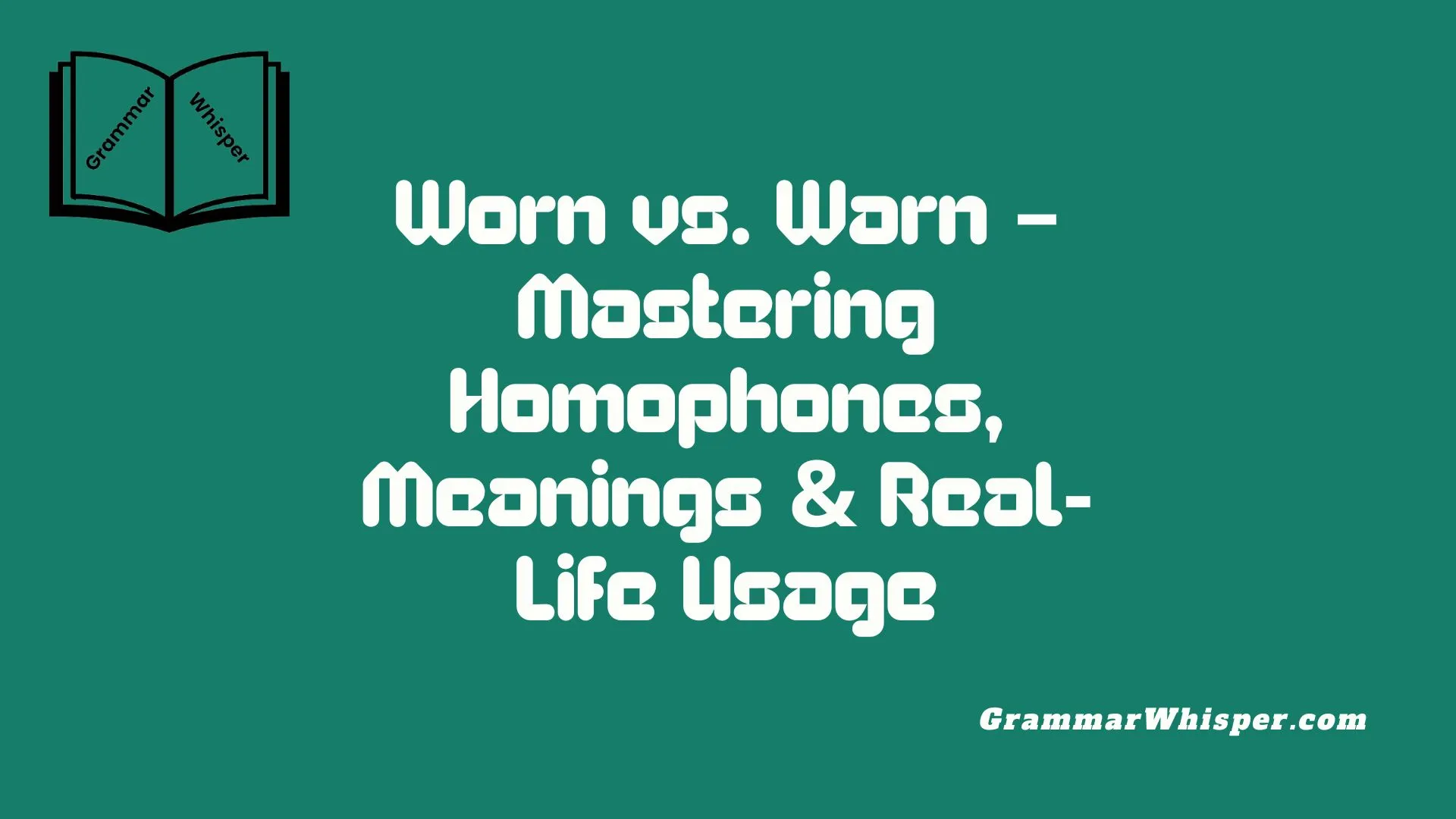Even seasoned English speakers can struggle with homophones like Worn vs. Warn. These words sound similar, but their meanings are entirely different. As someone who’s edited hundreds of drafts, I’ve seen how easily writers muddle their writing or speech by mixing up these simple terms. In one article, someone wrote about shoes that “warn out” – a common mistake that totally confused the sentence and ruined the flow. That’s why understanding tricky pairs like this really does matter, especially if you want to sound polished and professional.
To help you remember, start with the definitions and work through real-life examples. I usually advise my clients to keep a few handy tips for their everyday language use. The trick to mastering these differences isn’t about forced memorization, but about seeing them in context and using them confidently. The more you practice, the easier it gets – even if you’re misusing them now, it’s all about improving steadily.
What Are Homophones and Why Should You Care?
Homophones are words that sound the same but differ in meaning and sometimes spelling. They can make English tricky to learn and spell correctly.
Examples include:
- There, their, and they’re
- Right and write
- To, two, and too
Worn and worn fit right into this confusing group.
Why does this matter? Using the wrong homophone can:
- Change your meaning entirely
- Make your writing seem careless or confusing
- Lead to misunderstandings in conversations or professional settings
Understanding homophones sharpens your communication skills and helps you write clearly and precisely.
Deep Dive into ‘Warn’ – Meaning, Usage, and Examples
Warn is a verb. It means to inform someone about a possible danger, problem, or risk so they can prepare or avoid it. When you warn someone, you’re giving them a heads-up.
What Does ‘Warn’ Mean?
- To advise or notify someone about potential trouble or harm
- To caution about something dangerous or undesirable
Common Contexts for ‘Warn’
- Safety alerts (“The weather service warned of a storm.”)
- Advice from friends or experts (“She warned me not to trust him.”)
- Official notices (“The company warned employees about phishing scams.”)
Examples of ‘Warn’ in Sentences
- The teacher warned the students about the test format.
- Police warned drivers to avoid the icy roads.
- I warned you not to touch the hot stove!
- The sign warns visitors of slippery floors.
Tips on Tone and Form
Warn can be formal or informal, depending on context:
| Context | Tone | Example |
| Emergency alert | Formal, urgent | Authorities warn residents daily. |
| Casual advice | Informal | Mom warned me about staying out late. |
Remember, when you use warn, you’re actively alerting someone.
Exploring ‘Worn’ – Meaning, Usage, and Examples
Worn is the past participle of ‘wear’, used to describe something that has been used or damaged from use. It often describes clothes, shoes, or even feelings.
What Does ‘Worn’ Mean?
- Used or damaged through continuous use
- Showing signs of aging or fatigue
- Can describe physical objects or emotional states
Common Contexts for ‘Worn’
- Clothes that have faded or torn (“Her jeans are old and worn.”)
- Tires or equipment that have lost quality (“The tires are badly worn.”)
- Feelings or expressions (“He looked worn out after the long day.”)
Examples of ‘Worn’ in Sentences
- I have worn this jacket for five years.
- The carpet is worn thin in the hallway.
- She looked worn after working three shifts in a row.
- His shoes were so worn that they had holes in them.
Pronunciation Note
Worn rhymes with born, whereas warn rhymes with yawn in most American English accents.
Key Differences Between ‘Worn’ and ‘Warn’
When you put these two side-by-side, it’s easier to keep them straight:
| Aspect | Worn | Warn |
| Part of speech | Past participle (verb form) | Verb |
| Meaning | Used, damaged from wearing | To caution or alert |
| Pronunciation | /wɔrn/ (rhymes with “born”) | /wɔrn/ (same spelling but different regional pronunciation may apply) |
| Common errors | Confused spelling and misuse | Often misspelled or confused with ‘worn’ |
Quick tip:
Think of worn as something you’ve already worn out, and warn as something you do before something happens.
Memorization Strategies and Tricks
Confusing worn and warn happen to everyone, so here are some easy tricks to remember them.
Mnemonics
- Warn has an A – think A for Alert or Advice
- Worn has an O – think O for Old or Out of shape
Visual Associations
- Picture a jacket with holes (worn out) when you see worn
- Imagine someone shouting to stop or be careful when you see wa warningQuick Quiz to Reinforce
Fill in the blank:
- I ___ you about the icy road. (warn)
- His shoes are badly ___. (worn)
- The sign ___ visitors of danger ahead. (warn)
- That shirt looks really ___. (worn)
Synonyms and Vocabulary Boost
Expanding your vocabulary with synonyms helps you write more precisely and avoid repetition.
Word
Synonyms for ‘Warn’
Synonyms for ‘Worn’
Meanings
Alert, caution, advise, notify
Used, tattered, frayed, fatigued, threadbare
Examples in Sentences
- The guide alerted the hikers about the steep trail.
- His old coat looked threadbare and faded.
- She cautioned me to check the locks twice.
- The carpet was frayed around the edges.
Real-World Applications and Common Phrases
Using worn and warn correctly can make your communication clearer and more professional. Here are some common real-life uses and idiomatic expressions:
Common Phrases Using ‘Warn’
- Warn someone off: To advise against doing something. Example: The guard warned us off the restricted area.
- Fair warning: A clear notice before something happens. Example: You have fair warning about the deadline.
Common Phrases Using ‘Worn’
- Worn to a frazzle: Extremely tired or worn out. Example: After the marathon, she was worn to a frazzle.
- Worn thin: Losing strength or quality.Example: His patience was worn thin after hours of waiting.
Case Study: Warning Labels
Warning labels on products, like “Warning: Choking Hazard,” show the importance of warning in everyday life. These alerts help prevent accidents and inform users of risks.
Conclusion:
By now, you should see the difference between worn and warn. Remember:
- Warn means to alert or caution someone before a potential problem.
- Worn describes something that has been used or damaged.
Use the tips, mnemonics, and examples above to avoid mixing these up. Doing so will sharpen your English skills, make your writing clearer, and help you communicate like a pro.
Keep practicing with real sentences, notice these words in the wild – like in news stories or conversations – and soon you’ll never confuse worn and warn again.
Mastering homophones is a small step toward powerful, precise communication. Start today and watch your confidence soar!
If you’d like, I can provide downloadable practice worksheets or quizzes to reinforce this lesson!
FAQS:
What is the main difference between “worn” and “warn”?
“Worn” is the past participle of “wear” and describes something used or damaged from use. “Warn” is a verb that means to alert or caution someone about possible danger or problems.
How do you pronounce “worn” and “warn”?
“Worn” rhymes with “born” (/wɔrn/). “Warn” also has the same spelling but often rhymes with “yawn” in many American English accents. Pay attention to regional differences, but the meanings are distinct.
Can “warn” be used as a noun?
No, “warn” is strictly a verb. The noun form related to warning someone is “warning.”
Are there easy ways to remember the difference between “worn” and “warn”?
Yes! Think of “warn” with an A as Alert or Advice, and “worn” with an O as Old or Out of shape. Also, “worn” relates to something you have already used or worn out, while “warn” is what you do before something happens.
Can you give examples of common phrases using “warn” and “worn”?
Sure! Common phrases with “warn” include “warn someone off” and “fair warning.” For “worn,” you might hear “worn to a frazzle” (very tired) or “worn thin” (losing strength or quality).











